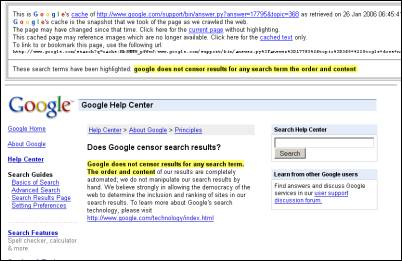Friday, January 27, 2006
Google Removes Its Help Entry on Censorship, More News
Incredible. Google removed their help entry on censorship, as Gary Price discovered. Here’s what it used to read:
“Google does not censor results for any search term. The order and content of our results are completely automated; we do not manipulate our search results by hand. We believe strongly in allowing the democracy of the web to determine the inclusion and ranking of sites in our search results. To learn more about Googles search technology, please visit ...”
This is what the page reads now:
“Document Not Found
Sorry, the document you requested is not available. You can visit the main page.”
The document at this time was still accessible through the Google cache (I’ve made a screenshot).
Google may now delete this help entry as well:
“As you may know, Google is a reflection of the web. Although we aggregate and organize content published on the web, we don’t control the content itself.
It’s our policy not to police or censor content.”
CNet tests Google.cn results
In the meantime, CNet’s Declan McCullagh took a closer look at what Google.cn agreed to censor, writing:
“Google’s new China search engine not only censors many Web sites that question the Chinese government, but it goes further than similar services from Microsoft and Yahoo by targeting teen pregnancy, homosexuality, dating, beer and jokes.”
Actually, some domains that are missing on Google.cn are available on e.g. Yahoo.cn or MSN. Declan also found, like I did during my comparison of Google.cn and Google.com, that users are not always informed when search results are missing. Declan points to a statement from Google, who say that “some Web site blockages are human errors that should be expected when any new service is introduced, and others represent a concerted attempt to comply with Chinese censorship laws.”
The forum discussion
In the ongoing forum discussion on this issue, Rocky argues:
“For keyword searches for which the govn’t wants google to restrict access to metadata (i.e. search terms such as “Tibet”, “Falun Gong”, etc where search results promoting one side of the argument don’t show up), Google should show no results. That is, Google could politely provide a notice that local laws restrict displaying many search results for that keyword and suggest looking elsewhere, without displaying the govn’t manufactured results.
The moral corrosion of “Google Certifying” a profoundly non-democratic presentation of key political, economic, and environmental issues (notwithstanding Google’s boilerplate disclaimer) outweighs the negligible advantage of the searcher being able to access those propaganda sites.
I ask Google, “what is the ostensible usefulness of providing links to sites demonizing Falun Gong?” Chinese websurfers can get that propaganda from every other domestic media outlet. If China isn’t demanding that Google actively distribute propaganda – and there have been no published indications that this is the case – why is Google doing it?”
Dave on the other hand says it’s better to have a working Google in China than no Chinese Google at all:
“I think Google have done the right thing. Better to have a Google in china then not one at all. Chinese users are going to better off than they have been, and once Google is in the strongly market, I’m sure it will use some of it’s strength to try and break down barriers.”
Search no evil? Protests
The Joy of Tech publishes a cartoon on the controversy. Others want to Googlebomb Google and connect it to the word “evil.” A more reasonable form of protest for those disagreeing with Google’s decision might be to protest in front of Google offices around the world, as some suggested.
At this time, there is still no statement on this controversy on the official Google blog.
[Thanks Danny and Hanan.]
Update: Google reactivated their help entry with a new text. “It is Google’s policy not to censor search results. However, in response to local laws, regulations, or policies, we may do so. When we remove search results for these reasons, we display a notice on our search results pages. Please note: For some older removals (before March 2005), we may not show a notice at this time.” [Thanks Brajesh Sachan.]
>> More posts
Advertisement
This site unofficially covers Google™ and more with some rights reserved. Join our forum!

